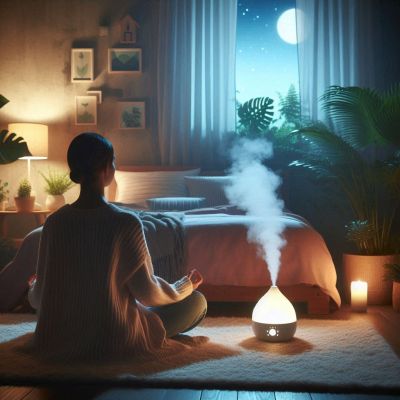As sleep medicine physicians or specialists in the field of sleep disorders, we understand that many individuals struggle with obtaining a restful night’s sleep.
While some may turn to prescription medications such as sleeping pills for relief, others may seek alternative methods to promote healthy and natural sleep patterns.
The question remains: is it possible to sleep without sleeping pills?
The use of sleeping pills can have potential side effects and risks, including dependency, rebound insomnia, impaired memory function, and more.
Additionally, not all individuals may be able to tolerate these medications due to allergies or pre-existing medical conditions.
As healthcare professionals dedicated to improving our patients’ overall health and well-being, it is important that we explore non-pharmacological approaches for managing poor sleep quality.
In this article, we will examine various techniques and strategies that may assist individuals in achieving a good night’s rest without relying on the use of prescription medication.
Understanding The Importance Of Sleep
 According to the American Sleep Association, adults need between seven and nine hours of sleep each night for optimal health.
According to the American Sleep Association, adults need between seven and nine hours of sleep each night for optimal health.
However, studies show that many people are not getting enough sleep due to poor sleep hygiene habits.
In fact, approximately 70 million Americans suffer from some form of sleep disorder.
Sleep hygiene refers to a variety of practices and habits that can improve your quality of sleep.
These include avoiding caffeine and heavy meals before bedtime, establishing a relaxing bedtime routine, and keeping the bedroom cool and dark.
Poor sleep hygiene can lead to difficulty falling asleep or staying asleep throughout the night.
The consequences of sleep deprivation are numerous and severe.
Chronic lack of sleep can increase the risk of developing medical conditions such as obesity, diabetes, heart disease, and depression.
It can also impair cognitive function, memory consolidation, and reaction time.
Furthermore, individuals with untreated sleep disorders such as insomnia or obstructive sleep apnea may experience daytime fatigue or drowsiness which could result in accidents or injuries.
Identifying the root causes of poor sleep is essential for improving one’s overall health and wellbeing.
By understanding how certain behaviors impact our ability to get adequate rest at night, we can make changes to our daily routines that promote better quality sleep.
Identifying The Root Causes Of Poor Sleep
Poor sleep is a common problem among individuals of all ages. While some people resort to sleeping pills to improve their quality of sleep, there are natural remedies and lifestyle changes that can help address the root causes of poor sleep. Identifying these root causes is crucial in finding effective solutions for improving sleep.
One common cause of poor sleep is stress. Stressful events or situations can make it difficult for an individual to fall asleep or stay asleep throughout the night. Natural remedies such as relaxation techniques like stress relief hypnosis, deep breathing exercises, meditation, or yoga may help reduce stress levels and promote better sleep. Additionally, engaging in regular physical activity during the day can also alleviate stress and lead to improved sleep at night.
Another factor that contributes to poor sleep is a lack of proper sleep hygiene practices. This includes having irregular bedtimes, spending excessive time on electronic devices before bedtime, and consuming caffeine or alcohol too close to bedtime. Making simple lifestyle changes such as establishing a consistent bedtime routine with relaxing activities like reading a book rather than using electronic devices may be helpful in improving overall sleep quality.
Furthermore, certain medical conditions such as obstructive sleep apnea (OSA) can interfere with restful and restorative sleep. Effective treatments for OSA include continuous positive airway pressure (CPAP) therapy which involves wearing a mask over the nose while sleeping that delivers pressurized air into the airways preventing obstruction during breathing cycles.
Identifying the underlying reasons behind poor sleep patterns is essential in developing effective strategies for achieving healthy restorative sleep without relying on sleeping pills. Incorporating natural remedies and making lifestyle changes such as maintaining good habits around bedtime routines have been shown to significantly improve one’s ability to fall asleep faster and enjoy more uninterrupted deep stages of slumber resulting in feeling rested upon awakening. Establishing a consistent pattern of going to bed at the same time each night will further reinforce this desired outcome leading ultimately towards optimal health outcomes associated with getting enough sleep.
Establishing A Consistent Sleep Routine
Poor sleep can significantly impact an individual’s life, leading to decreased productivity and cognitive functioning.
While some may turn to sleeping pills for relief, it is possible to improve sleep quality without medication through the establishment of a consistent sleep routine.
One way to establish a consistent sleep routine is by establishing bedtime rituals. These rituals should be calming activities that signal to your body that it’s time for bed.
For example, taking a warm bath or reading a book before going to sleep can help relax the mind and prepare the body for rest.
Another important aspect of improving sleep quality is avoiding sleep disruptors. This includes avoiding caffeine and alcohol consumption close to bedtime, as well as limiting exposure to screens such as phones and laptops in the hour leading up to bedtime.
Creating a dark and quiet sleeping environment can also promote better rest.
Practicing relaxation techniques can further enhance the effectiveness of these strategies. Techniques such as deep breathing exercises or progressive muscle relaxation can help reduce stress levels and calm the mind before bedtime.
By incorporating these practices into their nightly routine, individuals may find they are able to achieve deeper and more restful sleep without resorting to medication.
Overall, while sleeping pills may provide temporary relief from poor sleep quality, there are numerous non-medication-based strategies available that can lead to long-term improvements in overall health and wellness.
Establishing bedtime rituals, avoiding sleep disruptors, and practicing relaxation techniques are all effective ways one can work towards achieving optimal restorative rest each night.
Practicing Relaxation Techniques
Relaxation techniques can be effective in promoting sleep without the use of sleeping pills.
Meditation is a technique that involves focusing on a particular thought, object or activity to achieve mental and physical relaxation. It has been shown to reduce stress levels and improve overall well-being. By practicing meditation before bedtime, one can achieve a relaxed state which may lead to better quality sleep.
Breathing exercises are another technique used for relaxation. Deep breathing slows down heart rate and promotes relaxation by reducing muscle tension and calming the mind. These exercises involve inhaling deeply through the nose while counting to four, holding the breath for seven counts, and exhaling slowly through the mouth for eight counts. Practicing these techniques regularly helps train your body to relax quickly when you need it most.
Incorporating relaxation techniques into your daily routine can also help regulate your circadian rhythm (your body’s internal clock) which plays an important role in determining when you feel sleepy or alert. This means that if you consistently practice these techniques at the same time each day, your body will become more accustomed to relaxing at that time leading up to improved sleep patterns.
Overall, there are various non-pharmacological methods available to promote better sleep hygiene such as meditation techniques and breathing exercises. Utilizing these techniques regularly along with other healthy habits like regular exercise, avoiding caffeine close to bedtime, minimizing exposure to electronics prior to bed-time among others offer an excellent alternative approach towards achieving better quality sleep than relying on medications alone.
To further enhance their effectiveness creating a conducive environment for sound sleep is highly recommended; next we discuss how this could be achieved using simple adjustments around our bedroom space.
Creating A Sleep-Conducive Environment
As a sleep medicine physician, I often remind my patients that the environment in which they sleep plays a significant role in their ability to fall and stay asleep. Creating a sleep-conducive environment can help regulate your body’s natural circadian rhythm and make it easier for you to get the restful sleep you need every night.
One factor that can affect your sleep is lighting choices. Exposure to bright light before bedtime can disrupt your circadian rhythm by suppressing melatonin production, making it harder for you to fall asleep. On the other hand, dimming lights in the evening can signal to your brain that it’s time to wind down and prepare for bed. Consider using blackout curtains or an eye mask if outside light sources are affecting the quality of your sleep.
Bedding materials also play an important role in creating a comfortable sleeping environment. The right bedding should be breathable, lightweight and made from natural fibers such as cotton or linen. Avoid synthetic fabrics that trap heat and moisture, causing discomfort during nighttime hours. A supportive mattress and pillow will also contribute significantly towards achieving quality sleep.
By taking steps to create a conducive sleeping environment with appropriate lighting and bedding material, you’ll improve your chances of getting high-quality restorative sleep each night.
In addition to these environmental factors, incorporating exercise and healthy habits into daily routines can further enhance overall well-being necessary for good health-dedicated individuals who seek better outcomes regarding their health goals.
Incorporating Exercise And Healthy Habits
Aside from medication, there are several behavioral changes that could improve sleep quality without the need for sleeping pills.
One such habit is exercise. Engaging in regular physical activity has been shown to promote better sleep by reducing stress levels and increasing body temperature, which can induce feelings of drowsiness at night. However, it is important to note that strenuous workouts should be avoided close to bedtime as this could have a counter-effect on sleep.
Another technique that may help with falling asleep naturally is mindfulness meditation. This practice involves paying attention to present thoughts and sensations while letting go of judgment or distraction. Through consistent meditation sessions, individuals can train their minds to focus and relax leading up to bedtime, promoting deeper and more restful sleep throughout the night.
One’s diet also plays an essential role in achieving better sleep hygiene. Avoiding caffeine or heavy meals before bed could prevent indigestion or acid reflux symptoms from disrupting one’s slumber cycle. Instead, consider incorporating foods rich in melatonin production like cherries, almonds, or kiwis into your pre-bedtime snack routine.
Lifestyle modifications such as exercising regularly, practicing mindfulness meditation techniques before bed, and making dietary changes can all contribute towards enhancing natural sleep patterns without relying on sleeping pills.
By developing these healthy habits consistently over time, individuals may experience improved quality of life through increased energy levels during waking hours and overall mental clarity; however, if struggling with persistent insomnia despite implementing these strategies seeking professional help and guidance should be considered as well.
Seeking Professional Help And Guidance
Incorporating exercise and healthy habits into one’s daily routine can improve sleep quality. However, some individuals may still struggle with falling or staying asleep despite these lifestyle changes. In such cases, alternative therapies may be considered.
Alternative therapies include relaxation techniques like yoga, meditation, and deep breathing exercises. These practices promote a state of calmness that can help reduce anxiety and stress levels associated with insomnia.
Acupuncture is another alternative therapy which involves stimulating specific points on the body to balance energy flow and induce feelings of relaxation.
Cognitive behavioral therapy (CBT) is a type of talk therapy that helps individuals identify negative thoughts and behaviors surrounding sleep. CBT aims to restructure those patterns by teaching patients coping skills for dealing with stressors that lead to poor sleep quality. It also emphasizes good sleep hygiene practices such as limiting caffeine intake before bed, establishing a regular sleep schedule, and creating a relaxing bedtime routine.
While sleeping pills are an option for treating insomnia, they come with potential side effects and risks if not used properly. Alternative therapies and cognitive behavioral therapy offer effective non-pharmacologic approaches for improving sleep without the use of medication.
A consultation with a healthcare provider who specializes in sleep medicine or a qualified therapist trained in CBT can provide guidance on appropriate treatment options based on individual needs.
Frequently Asked Questions
What Are Some Natural Remedies For Sleeplessness?
The prevalence of sleeplessness has led to the exploration of natural remedies, including meditation techniques and aromatherapy benefits.
Meditation is a practice that involves focusing one’s mind on a particular object or thought in order to achieve relaxation and reduce stress levels. Research suggests that regular meditation can significantly improve sleep quality by reducing cortisol levels and enhancing melatonin production.
Aromatherapy, on the other hand, involves using essential oils derived from plants to promote relaxation and induce sleep. Certain scents like lavender, chamomile, and valerian root have been found to have sedative effects, making them effective for treating insomnia.
As a sleep medicine physician or specialist in sleep disorders, it is important to consider these natural remedies as potential options for patients experiencing difficulty sleeping without resorting immediately to prescribed medications such as sleeping pills.
How Long Does It Take For The Body To Adjust To A New Sleep Routine?
Consistently adhering to a sleep routine can offer several benefits, including improved mood, enhanced cognitive function and better overall health. However, changing one’s sleep schedule may take some time for the body to adjust.
Strategies that are helpful in adjusting to a new sleeping pattern include gradually shifting bedtimes and waking times by 15-30 minutes each day until the desired schedule is achieved; avoiding caffeine or alcohol intake before bedtime; creating a relaxing pre-sleep ritual such as reading or taking a warm bath; and practicing relaxation techniques such as meditation or deep breathing exercises.
It is important to note that these strategies may not work immediately for everyone but can be effective with consistent practice over time. As a sleep medicine physician, it is recommended to consult with a healthcare professional if experiencing persistent difficulty falling asleep or maintaining sleep despite implementing these strategies.
Is It Safe To Take Herbal Supplements For Sleep?
Herbal supplement alternatives have become increasingly popular for treating sleep disorders. These supplements are readily available and come in different forms, including teas, extracts, and pills.
While some herbs like valerian root and chamomile may help induce relaxation and improve sleep quality, others such as kava and passionflower carry potential risks that warrant caution when taking them.
As a sleep medicine physician or specialist, it is important to consider the individual’s medical history before recommending any herbal supplements for sleep since they can interact with other medications or exacerbate existing health conditions.
It is crucial to inform patients of the potential side effects associated with these supplements and advise them on proper dosage and duration of use.
Can Certain Foods Affect Sleep Quality?
The quality of sleep can be influenced by various factors including dietary patterns.
Consumption of melatonin-rich foods has been shown to have a positive impact on improving sleep quality.
Foods such as tart cherries, walnuts, and kiwis are examples of natural sources of melatonin that may aid in regulating the circadian rhythm.
On the other hand, caffeine intake should be limited especially during late afternoon or evening hours since it can disrupt sleep onset and maintenance.
It is recommended to avoid high amounts of processed sugars which spike blood sugar levels and interfere with deep sleep stages.
As a sleep medicine physician/specialist, it is important to educate patients about making appropriate food choices for better sleep outcomes, while also considering individualized needs and preferences.
How Can Technology Use Affect Sleep Patterns?
Like a ship navigating through uncharted waters, the use of technology in our daily lives can impact our sleep patterns.
The advent of sleep tracking wearables has allowed individuals to quantify their sleep quality and duration, but it may also create an obsession with achieving the perfect night’s rest.
Additionally, blue light filtering devices have become popular among those who want to reduce their exposure to artificial light before bedtime.
However, more research is needed to determine whether these devices actually improve overall sleep quality.
As a sleep medicine physician or specialist in sleep disorders, it is important to consider the potential benefits and drawbacks of incorporating technology into one’s sleep routine.
Insomnia is a common sleep disorder that can significantly impact one’s daily life. While sleeping pills may offer quick relief, they come with potential side effects and risks of dependence.
Fortunately, there are natural remedies that can help improve the quality and duration of sleep without resorting to medication. Establishing a regular bedtime routine, practicing relaxation techniques such as meditation or yoga, and avoiding caffeine and alcohol before bed are all effective methods for improving sleep.
Additionally, certain herbs like valerian root and chamomile have been shown to aid in promoting restful sleep when taken in appropriate doses. It is important to note that adjusting to these lifestyle changes may take time, with some studies suggesting it can take up to six weeks for the body to adapt fully.
However, making these adjustments can lead to long-term benefits for both physical and mental health. As a sleep medicine physician or disorder specialist, I highly recommend exploring natural remedies for insomnia before turning to medication.
While herbal supplements can be helpful in moderation, it is crucial to consult with a healthcare professional before taking any new substances. By prioritizing healthy sleep habits and incorporating natural remedies into your routine, you will likely experience improved overall well-being and better quality rest – something we all need more of in our busy lives.
In conclusion, let us not underestimate the power of simple yet effective strategies for treating insomnia. As poet Langston Hughes once said: ‘Hold fast to dreams /For if dreams die /Life is a broken-winged bird /That cannot fly.’ With dedication and perseverance towards achieving better sleep hygiene practices, individuals struggling with insomnia can reclaim their ability to dream big again!











